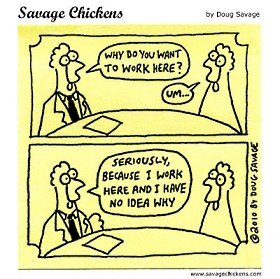No matter who you are, it can happen to you.
Photo Credit: JD Hancock
One of the questions I get asked most is about overcoming ageism.
More specifically, older job seekers – 40 year-olds and up – send in resumes that never get responses or worse, they show up to interviews only to hear that they’re supposedly overqualified.
'Research has shown that ageism is the most tolerated form of prejudice when compared to racism & sexism'. #FLageingwell
— Miriam Ahern (@MiriamAhern) February 11, 2016
With this happening every day, how are “super-experienced” job seekers supposed to cope?
And what about sufferers of other forms of illegal recruiting discrimination based on gender, race, religion, disability, ethnicity, sexual preference, political affiliation, etc.?
Free bonus: Download The Midlife Job Search Report, a handy guide I compiled for older job seekers.
The hard reality
Qualifications are often NOT the deciding factor for hiring companies.
Think about that for a second.
Doesn’t seem fair, does it?
Yet it must be true. Otherwise, being overqualified wouldn’t be such a common rejection. Instead, companies would consider the best, most hireable candidates to be the ones with the best/most qualifications, i.e. the overqualified ones.
Why it is true
There’s research to back this up.
Northwestern University Management and Organizations professor Lauren Rivera’s study “Hiring as Cultural Matching: The Case of Elite Professional Service Firms” appeared in the December 2012 edition of the American Sociological Review.
A Huffington Post article about it had this conclusion:
“Rivera found many people are looking for a good “cultural fit.” In other words, they want to find people with similar profiles to themselves outside of work. In fact, more than half of the study’s participants rated “fit” as the most important criteria in hiring — even more so than analytical thinking and communication.
While these tendencies don’t mean that employers hire unqualified candidates, Rivera said the research suggests that once job candidates have met a certain threshold in terms of their job skills, their interpersonal connection and fit with the interviewer become the deciding factors in whether they make it to the next round.”
And I can back it up
This reminds me of a story from my last salary job in France, managing a team of web developers.
It was the fall of 2003, and after a few weeks of discussion and intense lobbying, I got the go-ahead to hire a badly-needed new team member.
I wrote up a job description, HR published (a version of) it on at least one major job board, and resumes started to stream in.
After a few weeks of interviewing and testing the top 5 candidates, I had the shortlist narrowed down to two.
Here’s the thing- they were both equally qualified.
I was convinced that either one could have succeeded in the role, but as you can imagine, I was leaning towards one of them.
To seal the deal, I sat down for a chat with my boss, who had also interviewed the final candidates.
“What do you think?” I asked, not yet telling him my own choice.
“The last two both seem good, but I like Victor [not his real name] more. He just seems like a cooler guy [to work with].”
“Me too.”
With this in mind, here is:
The Quick Guide To Beating Job Search Discrimination
As the one who anticipates being discriminated against, and depending on the type of discrimination, you potentially have 3 ways of dealing with the problem:
1) Ignore it
Remember Victor above? He’s black.
A few months after he joined the team, we were talking and I asked him if he’d ever had any problems with job interviewers, blatant or otherwise.
He said that he may have, but he long ago decided to take to heart an uncle’s advice that those thoughts were too easy to use as an excuse for not getting the result wanted.
Vic will just go on to the next hiring company without thinking twice.
2) Take it on
If you think you’re outside a company’s desired candidate pool, you need to convince them that you’re actually inside it, by adopting the same job search tools and practices that the desired candidates are using and learning about on blogs like JobMob.
If you’re an older job seeker, you need to job search like a younger job seeker.
If you’re a foreigner, you need to job search like a local.
You get the idea.
3) Avoid it
Thinking of applying for work at a certain company?
Simple: take a few minutes or even an hour to search their current employees’ LinkedIn profiles, with an eye to looking for a proven track record of them having already hired people like you.
If you’re a visible minority, check the employee portraits.
If you’re an older job seeker, look for people with 20+ years of experience who aren’t founders.
Finally-
You don’t want to work with anyone who doesn’t want to work with you. Accept that it can happen and move on, putting yourself in a position to succeed with the tips above.
Free bonus
The Midlife Job Search Report is a handy guide I compiled to help older job seekers.
This free download contains:- 5 Common Mistakes Older Job Seekers Make
- How To Defeat Any Form of Job Search Discrimination
- 9 Real Reasons Overqualified Job Seekers are Rejected
- 40 Tips for Older Job Seekers That Actually Get Results

JobMob Insiders can get this free bonus and other exclusive content in the JobMob Insider Bonuses area. Join now, it's free!
Subscribe to JobMob via email and follow me on Twitter for more real world job search insights.
via JobMob More Information Here..



No comments:
Post a Comment